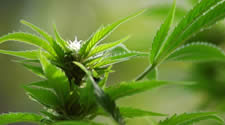 The World Health Organization has released its long-anticipated recommendation on cannabis scheduling. But rather than removing it from Schedule I of the Single Convention, it only removes it from Schedule IV, where it is also listed. CBD, however, has indeed been de-scheduled entirely.
The World Health Organization has released its long-anticipated recommendation on cannabis scheduling. But rather than removing it from Schedule I of the Single Convention, it only removes it from Schedule IV, where it is also listed. CBD, however, has indeed been de-scheduled entirely.
Cannabis advocates around the world have been waiting on the UN World Health Organization to issue its finding on whether the status of cannabis and cannabinoids under the relevant international treaties should be changed.
The "critical review" from the WHO's Expert Committee on Drug Dependence (ECDD), promised last year, is now in. Although the "Report of the 41st ECDD" has not yet been formally published, an "Extract" of the section concerning cannabis has been released, and appears as a PDF on the Marijuana Business Daily website. While it is hardly the coup advocates had been hoping for, it still represents some progress—especially where CBD is concerned.
First the bad news: cannabis stays in Schedule I
It begins with Recommendation 5.1: "The Committee recommended that Cannabis and Cannabis Resin be deleted from Schedule IV of the 1961 Single Convention on Narcotic Drugs."
As the text explains, cannabis and cannabis resin are included in both Schedule I and Schedule IV of the 1961 Single Convention on Narcotic Drugs. Substances that are included in both these schedules are considered "particularly liable to abuse and to produce ill-effects and have little or no therapeutic use." Other substances listed under both these schedules are fentanyl analogues and heroin—rightly "considered especially dangerous," all the more so in light of the current opioid crisis.
Refreshingly, the report found: "The evidence presented to the Committee did not indicate that cannabis plant and cannabis resin were particularly liable to produce ill-effects similar to the effects of the other substances in Schedule IV... In addition, preparations of cannabis have shown therapeutic potential for treatment of pain and other medical conditions such as epilepsy and spasticity associated with multiple sclerosis. In line with the above, cannabis and cannabis resin should be scheduled at a level of control that will prevent harm caused by cannabis use and at the same time will not act as a barrier to access and to research and development of cannabis-related preparation for medical use."
However, the ECDD did not call for removing cannabis from Schedule I—which is the more operative question where US law is concerned.
Next up are recommendations 5.2.1, 5.2.2., 5.3.1. and 5.3.2., in which the ECDD recommends that dronabinol (the THC analogue being marketed as Marinol) and its stereoisomers (that is, the natural endocannibinoids it mimics, basically forms of delta-9- tetrahydrocannabinol or THC) be removed from Schedule II of the 1971 Convention on Psychotropic Substances and placed in Schedule I of the Single Convention.
This also has little effect on US law, which already classifies THC as a Schedule I substance—despite the fact that its synthetic analogue dronabinol is placed by the Drug Enforcement Administration under the less restrictive Schedule III.
Better news for extracts, CBD
The ECDD's recommendations are more encouraging where they address extracts and cannabidiol (CBD), the non-psychoactive cannabinoid now the subject of intense interest by the medical community.
Recommendation 5.4 calls for "deleting Extracts and Tinctures of Cannabis from Schedule I of the 1961 Single Convention on Narcotic Drugs." Mind you, this primarily concerns extracts and tinctures containing only CBD, as THC (as we have seen) is to remain prohibited under the recommendations.
Which brings us to Recommendation 5.5—probably the most meaningful of the document: "The Committee recommended that a footnote be added to Schedule I of the 1961 Single Convention on Narcotic Drugs to read: 'Preparations containing predominantly cannabidiol and not more than 0.2 percent of delta-9-tetrahydrocannabinol are not under international control.'"
If the recommendations are followed and relevant treaties reworked by member nations, CBD will be descheduled, and effectively become an over-the-counter drug worldwide.
These recommendations follow related changes by national governments over the past year. Most significantly, the United Kingdom in October removed cannabis from Schedule I and placed it in Schedule II where its own internal law is concerned. In September, the US DEA removed the CBD-derived drug Epidiolex (although not CBD itself) from Schedule I and placed it in the far less restrictive Schedule V. Finally, the federal Farm Bill signed by President Trump in December descheduled hemp-derived CBD (although, confusingly, not chemically identical CBD derived from strains withe more than 0.3% THC).
Cross-post to Cannabis Now
Photo by Drome







Recent comments
1 day 2 hours ago
1 week 9 hours ago
5 weeks 16 hours ago
8 weeks 6 days ago
12 weeks 6 days ago
13 weeks 4 days ago
23 weeks 4 days ago
27 weeks 5 days ago
28 weeks 5 days ago
28 weeks 5 days ago